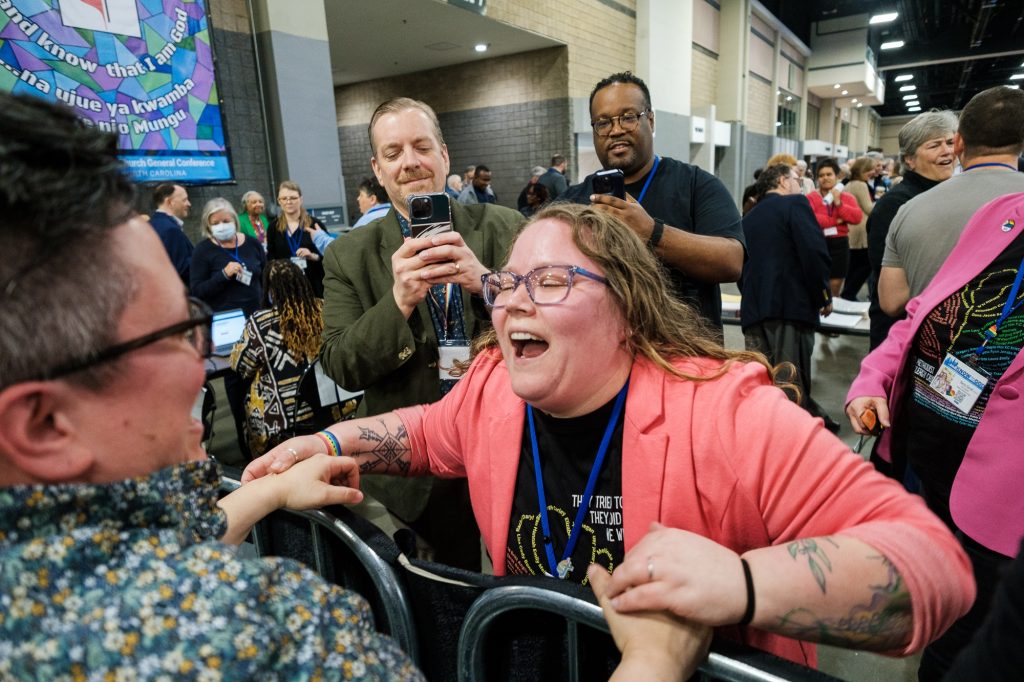The United Methodist Church’s postponed 2020 General Conference–now officially the 2020/2024 General Conference–held in Charlotte, NC from April 23 to May 3, was an intense experience for all delegates, including those from Eastern PA and Greater New Jersey. They sometimes worked 12-hour days, deliberating and voting on critical legislation that will influence the direction of our denomination for the next four years.
Overall, many delegates voiced amazement at how unified and spirit-filled this General Conference was. In the evenings, EPA and GNJ delegates took time to share video reflections watched by fellow United Methodists back home.
Regionalization
In historic votes for the church, delegates broadly approved a constitutional amendment and related petitions to put the denomination’s geographic regions—the U.S., Africa, Europe and the Philippines—on equal footing. The amendment now goes to annual conferences for potential ratification.
“What better gift could there be than to be a part of this historic moment in the life of our beloved church” said EPA delegate Rev. Lydia Esther Munoz, celebrating her birthday that day. “We can move in a direction that the spirit is taking us, where context matters,… and still remain one church.”
Removal of Harmful Language
At another pivotal moment the conference, without debate, removed the denomination’s longstanding ban on ordained clergy who identify as “self-avowed practicing homosexuals,” a rule established in 1984. Another popular decision prevents clergy and churches from being penalized for engaging in or refraining from conducting same-sex weddings.
Joyous applause, embraces and celebratory hymn singing erupted during a recess. “Our ordinations are now legal!” shouted a tearful Rev. Kaleigh Corbett Rasmussen, GNJ delegate. Barriers imposed by exclusionary language seemed to dissolve, signaling a new era of inclusivity.
“Full inclusion requires baby steps to achieve completely,” said the Rev. David Gaitan of Trinity UMC in Ewing, NJ, who was there to observe. “We have taken one today.”
Social Principles Revision
The Conference revised the harmful language in the Social Principles by removing the phrase “the practice of homosexuality… is incompatible with Christian teaching,” ending the church’s 52-year anti-LGBTQ stance.
“I remember 1972,” said Judy Ehninger, EPA’s lead lay delegate. “I want you to know I’ve been praying for this day for 52 years.”
The Rev. William Williams III of GNJ discussed the broader implications of this change, “If we don’t try to live into who we say we are, it harms our witness to the world… I’m glad to have been a part of passing the revised Social Principles. Now we need to live into them.”
GNJ’s young adult delegate Moselle Jules shared how the inclusion of queer persons has rekindled her hope in The United Methodist Church. “I think the church has an amazing opportunity to create disciples and to foster young people,” she stated. “It is nice to see that we can work together to create something for the future.”
A Different Spirit of Joy, Excitement
This General Conference passed other groundbreaking legislation, including giving deacons full sacramental authority.
The Rev. Edward Cameron, an EPA delegate and deacon, was excited about that change. “It gives me numerous opportunities to practice the sacraments in my church and beyond,” he said. “It’s been a long time coming, and we are thankful that the church recognizes our role as deacons in extending the church to the world as a place where the sacraments can be both presented and received.”
First-time attendee and EPA reserve lay delegate Kristine Adams shared her initial apprehensions amid the positive turn of events, saying, “This is my first General Conference, and I had some apprehension before coming. It has been nothing but peace and love, and I really felt the Spirit. Everyone here is trying to work together—listening to each other.”
Bethany Amey-Sutton, lay leader of GNJ’s delegation, observed a transformative atmosphere. “There was a different spirit—a joy and excitement about the way we are building a church that is truly open for all people. There was a commitment to working together.”
While ending the temporary allowance for churches to disaffiliate and take their property, the Conference agreed to “reaffiliation,” a grace-filled measure of reconciliation. It allows disaffiliated churches or defrocked clergy to have a potential pathway back into The United Methodist Church.
“At this General Conference, we’re leaving that light on for people who maybe felt that light was not on for them,” said the Rev. Dawn Taylor-Storm, EPA delegation co-leader. Reflecting on her childhood, when her parents would leave the light on for her to return home, she shared. “We want to say to them: ‘Welcome home. It’s a safe place. This is a sanctuary for you. And the light is on.’”
Main photo: Rev. Kaleigh Corbett Rasmussen, GNJ delegate, is joyful after General Conference votes to remove language denouncing and rejecting the full participation of LGBTQ members. Corbin Payne photo

